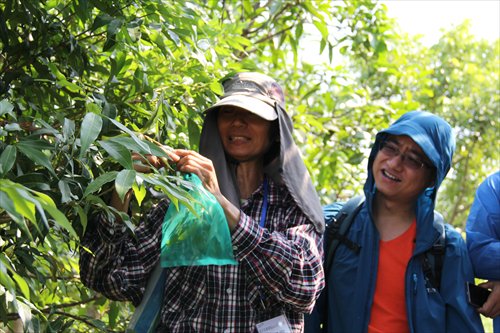

Chen Tongkui and villagers from Boxue village visit a Taiwan village in January this year.
Young Chinese intellectuals are trying to return to their hometowns, reviving the village life they remember from their youth. But in the teeth of deserted villages and growing agribusiness, it's proving a hard task.
Chen Tongkui says this may be the lowest moment of his life.
Five years ago, inspired by a Taiwan village's success on community development, he started to build his hometown, an old hamlet of 300 villagers in South China's Hainan Province, into an ecological community that can develop rural tourism and create work opportunities by attracting urban residents who desire for a healthy, green farm life on their weekends and holidays.
His home village of Boxue has bad crop conditions and the basic infrastructure was poor.
In the past five yeas, he has made some achievements, such as improving the basic infrastructure, drawing in visitors in and out of China, and building a track to host bike-racing events. He roughly transformed the village from a poor remote countryside into an attractive place.
Chen said he achieved all the promises he made to the villagers five years ago, but still, his plan is a failure.
"The village is still deserted. Young people are still leaving. Villagers are no longer as close as before, only caring about their own interests. The village committee, a self-governing organization in the rural areas but plagued with corruption, failed to connect people," Chen, who used to be a reporter at the Guangzhou-based Nanfang Daily, told the Global Times.
"The old structure of the traditional villages is disappearing."
Chen quit his job as a senior journalist in 2009 and devoted himself to changing the neighborhood where he grew up.
Chen is not alone. There are increasing numbers of young intellectuals who came from the rural areas and oppose modern agribusiness, returning to their hometowns and wider rural areas to participate in village renovation. They have brought in a fresh air of maintaining the traditional way of agriculture, and help to keep farmers on the land by increasing their incomes.
They have experimented with different methods of rebuilding villages. Some have used their social resources and collected money to fully engage into the community rebuilding. Some have tried to solve rural problems by new economic methods. Some established companies to sell organic food produced by the farmers online.
Ecological village
Chen misses the traditional lifestyle in China's rural areas where people were closely connected and villagers lived on the farm when he was young. He also recalled, when he became the first college student from the village, how all the villagers hosted a banquet and collected money for his tuition fees and living costs.
"This was the sort of village in my deep memories," Chen said.
The current situation in the rural areas saddens him. Many centuries-old stone houses were demolished. Old trees were chopped off. Young people left villages to become migrant workers.
"Farmers should return to the land. They should be capable of raising a family by farming. This is how we can rebuild the community and let villagers live happily on their own land."
When Chen was invited to visit a village in Chinese Taiwan that was once a poor hamlet but has now become an ecological tourism destination that drew in 22 million yuan ($3.53 million) revenue by developing tourism, he was inspired.
Chen's village was poor but had a long history. The average annual income was just 2,000 yuan and farmers lived off their own produce.
Chen firstly was determined to copy the success of the Taiwan village.
Earning trust from the villagers came as the top priority. In 2009, he returned to his village and set up a development council that involved 20 capable men in the village as council members. The council adopted a democratic voting process.
The council received a welcome from the public soon after Chen refused a large bribe from a real estate developer who wanted to build the village into a golf resort.
With support from the villagers, Chen and his council soon repaired a road, held a bicycle-racing event and built some ecological fruits gardens with the aid from Taiwan villages. The environment and the basic infrastructure improved a lot. In 2012, a group of artists from South Korea visited the village.
Gradually, Boxue became known to the public after media exposure.
Village coup
However, Chen's renovations faced problem after the village head changed.
"I realized, my projects went smoothly when the village head was wise and open. After the new village head who had a closed mind took office, the operations of the council were suspended," Chen said.
The growing reputation of the council has somehow threatened the power of the village head who practically seized power, Chen said.
Without support from the village head, Chen had to seek other ways.
Copyright ©1999-2018
Chinanews.com. All rights reserved.
Reproduction in whole or in part without permission is prohibited.